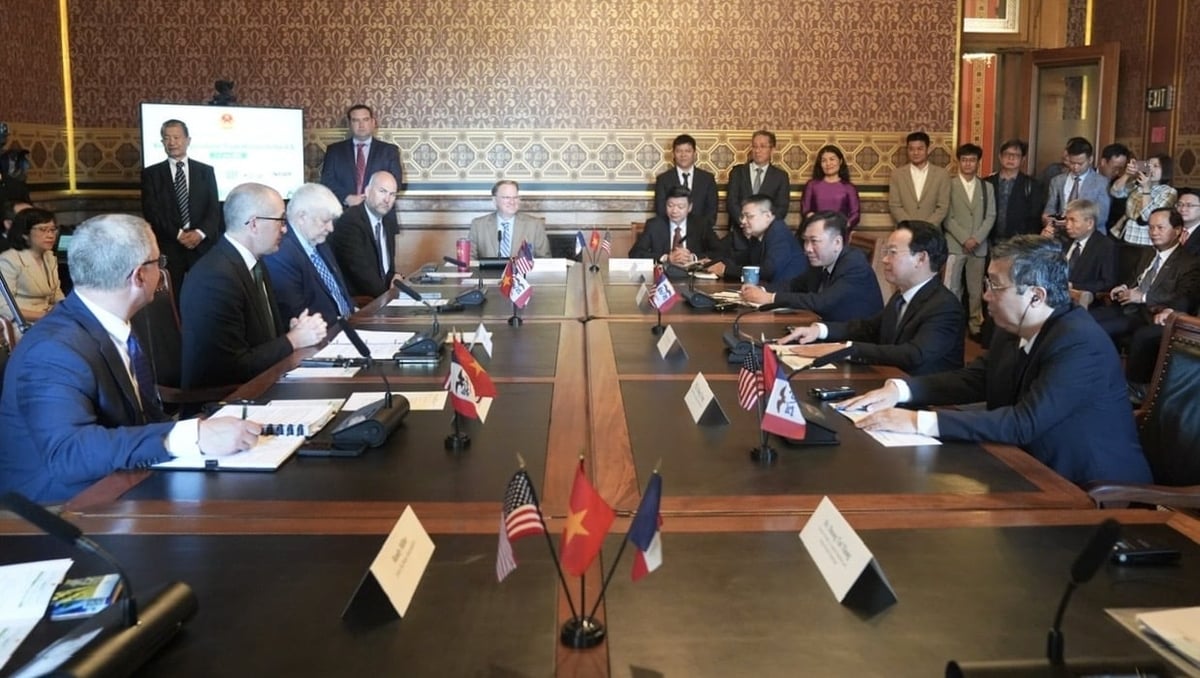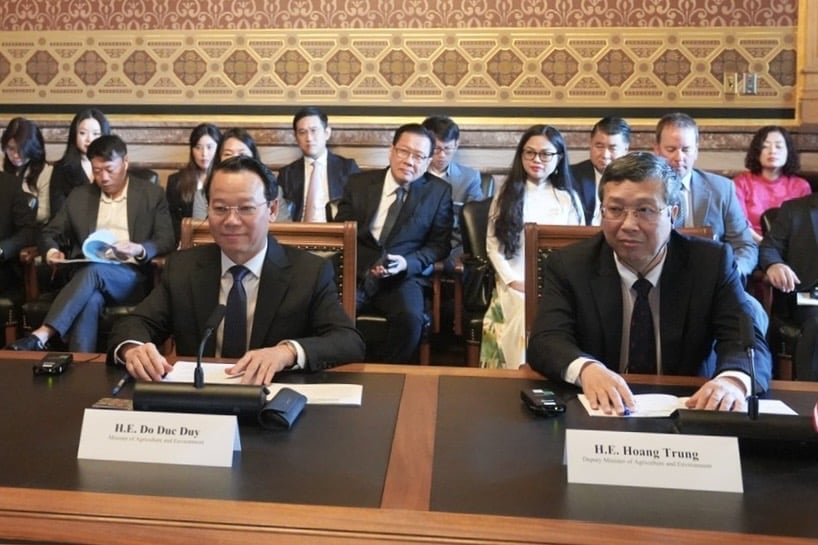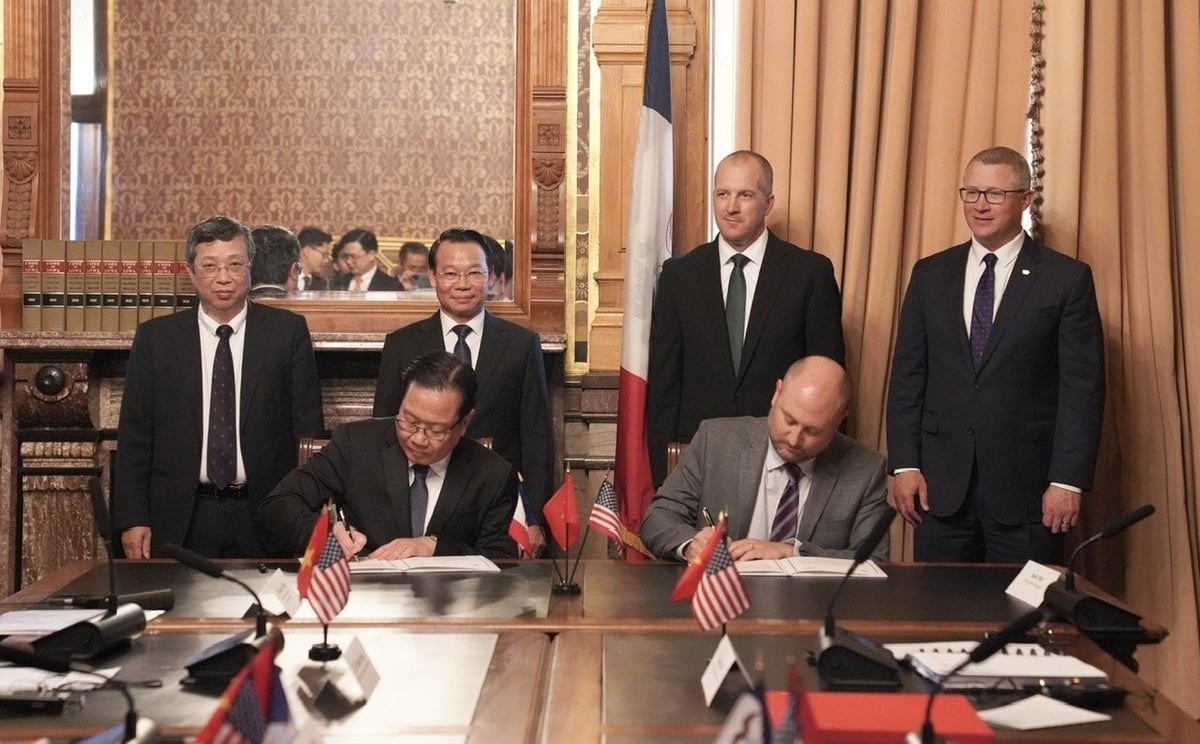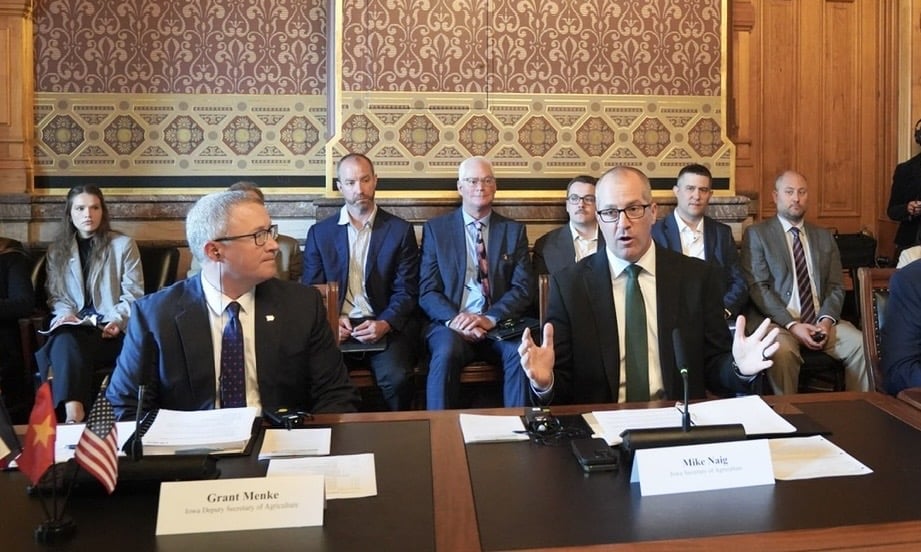December 30, 2025 | 15:37 GMT +7
December 30, 2025 | 15:37 GMT +7
Hotline: 0913.378.918
December 30, 2025 | 15:37 GMT +7
Hotline: 0913.378.918
On June 2, a delegation from Vietnam’s Ministry of Agriculture and Environment (MAE), led by Minister Do Duc Duy, began its official visit to the United States with its first stop in Iowa. Iowa Secretary of Agriculture Mike Naig and Deputy Secretary Grant Menke welcomed the Vietnamese delegation.

Working session between Vietnam’s Ministry of Agriculture and Environment and Iowa’s Department of Agriculture. Photo: Negotiation Delegation.
Minister Do Duc Duy said he was honored to lead the Vietnamese delegation, which included representatives from MAE's technical departments, industry associations, and businesses, to Iowa. In an open and constructive atmosphere, both sides exchanged insights on the agricultural landscapes of Vietnam and Iowa.
With a long-standing farming tradition, Iowa is recognized as the top corn-producing state in the U.S., producing around 50 million tons of corn annually. The state also grows other grains like rye and wheat, along with a variety of fruits. Meanwhile, Vietnam has become one of the world’s leading agricultural exporters, making a significant contribution to global food security.
“We’re constantly working to expand our processing capacity, strengthen quality control, and promote sustainable agricultural development. This opens opportunities for both sides to complement each other and jointly build stable, long-term agricultural value chains,” said Minister Duy.
During the seminar, the two sides reviewed the current state of agricultural trade and exchanged information, interests, and opportunities for business cooperation. The discussion helped outline practical directions for boosting the exports of high-quality agricultural products from Iowa to Vietnam and vice versa.
The delegation of 50 Vietnamese agribusinesses expect to sign Memorandums of Understanding (MoUs) to purchase over 2 billion USD of agrifood products from the U.S. Particularly for the state of Iowa, businesses and associations from both sides have signed five MOUs with a total value of approximately $800 million over the next three years. Those are significant deals compared to the $44 million in agricultural exports from Iowa to Vietnam in 2024.
Specifically, Vietnam’s Khai Anh Binh Thuan Company signed MOU to import one million tons of soybean meal, valued at approximately $380–390 million, from its partner Ag Processing Inc (AGP). The company also committed to purchasing 900,000 tons of corn and wheat from United Grain, valued at around $250 million.
Viet Nhat Nutrition Technology Company signed a contract with POET Group to import 100,000 tons of DDGS and 100,000 tons of soybean meal, with a total value estimated at $60–70 million.
A public-private partnership between the two countries also expanded through MOU between the Department of Livestock Production and Animal Health, under Vietnam’s Ministry of Agriculture and Environment, and the Iowa Pork Producers Association (IPPA). Under this agreement, both sides committed to strengthening trade ties and promoting collaboration between Vietnamese and Iowa pork industry by organizing technical seminars, market promotion, and trade missions.

Minister Do Duc Duy and Deputy Minister Hoang Trung at the meeting between Vietnam's Ministry of Agriculture and Environment and the Iowa State Department of Agriculture. Photo: Negotiation delegation.
In addition, the meeting provided opportunities for many other Vietnamese and U.S. businesses to connect, opening new avenues to enhance trade relations and strengthen the Vietnam–U.S. agricultural supply chain linkages. These connections are expected to accelerate the transfer of advanced U.S. technologies to Vietnamese agribusinesses, paving the way toward green, smart, and sustainable agricultural development in Vietnam.
Minister Do Duc Duy expressed his confidence that today’s event marks the beginning of a new phase of deeper and more effective cooperation between the Vietnamese business community and the state of Iowa. He emphasized that the outcome reflects the shared goodwill of both sides to advance the Comprehensive Strategic Partnership between Vietnam and the U.S.

Leaders of the Ministry of Agriculture and Environment of Vietnam and the Iowa Department of Agriculture witnessed the signing ceremony of the Memorandum of Understanding on trade cooperation in agriculture, forestry and fisheries. Photo: Negotiation delegation.
At the seminar, Mr. Ngo Hong Phong, Director of the National Authority for Agro-Forestry-Fishery Quality, Processing and Market Development (NAFIQPM - MAE), provided an overview of agricultural trade relations between Vietnam and Iowa state.
Vietnam and the U.S. have highly complementary agricultural product structures. Vietnam specializes in tropical crops, including rice, coffee, pepper, vegetables, and fruits. Its long coastline also supports aquaculture, especially shrimp and pangasius. Meanwhile, the U.S. leads in temperate products like corn, wheat, soybeans, dairy, meat, temperate fruits, and seafood such as Alaskan lobster and cod.

Mr. Mike Naig, Secretary of Agriculture of Iowa (front row, right) speaks at the meeting. Photo: Negotiation delegation.
Seasonal differences, driven by contrasting climates, help maintain a year-round supply for both domestic and international markets. This gives consumers in both countries more options for tropical and temperate fruits across the Pacific. As a result, agricultural trade between Vietnam and the U.S. tends to complement rather than compete, fostering a shared supply chain between the two nations.
At the end of his presentation, Mr. Phong offered several recommendations for U.S. businesses interested in exporting agricultural, forestry, and fishery products to Vietnam, including details on food safety regulations. He emphasized: “We must take full advantage of the incentives gained through trade negotiations between our two governments, especially within the framework of the growing Comprehensive Strategic Partnership.”
Vietnamese agribusinesses are actively seeking U.S. partners to import key commodities, including animal feed, fertilizers, biopesticides, meat products, frozen seafood, and raw timber.
Translated by Quynh Chi

(VAN) Located in three former provinces, Nam Dinh, Thai Binh, and Ninh Binh, and now in two provinces, Ninh Binh and Hung Yen, "Red River Delta" is the name of Vietnam's first interprovincial coastal wetland World Biosphere Reserve.
/2025/12/29/1046-1-210728_624.jpg)
(VAN) In 2025, Viet Nam recorded severe and extreme disasters, breaking multiple historical records and causing heavy losses in lives, property, and infrastructure nationwide.

(VAN) Applied technologies, water-saving irrigation is a strategic solution to promote climate-resilient agriculture and strengthen water security in the uplands.
/2025/12/29/3936-3-163422_251.jpg)
(VAN) Can Gio mangrove forest in particular and the entire Can Gio Mangrove Biosphere Reserve in general hold great potential for carbon credits.

(VAN) Chu Pah Rubber has announced its products that comply with the EU Deforestation Regulation (EUDR), affirming its commitment to sustainable production and product origin transparency.

(VAN) Deputy Director Nguyen Hoai Nam stated that a digital data platform will be developed with agricultural sector databases, utilizing AI to help farmers make informed decisions on 'watering correctly, sufficiently, and efficiently.’
/2025/12/29/4841-2-134224_777.jpg)
(VAN) From only about 10 individuals in 2009, the wild elephant population in Dong Nai has recovered to nearly 30 animals after more than 10 years.